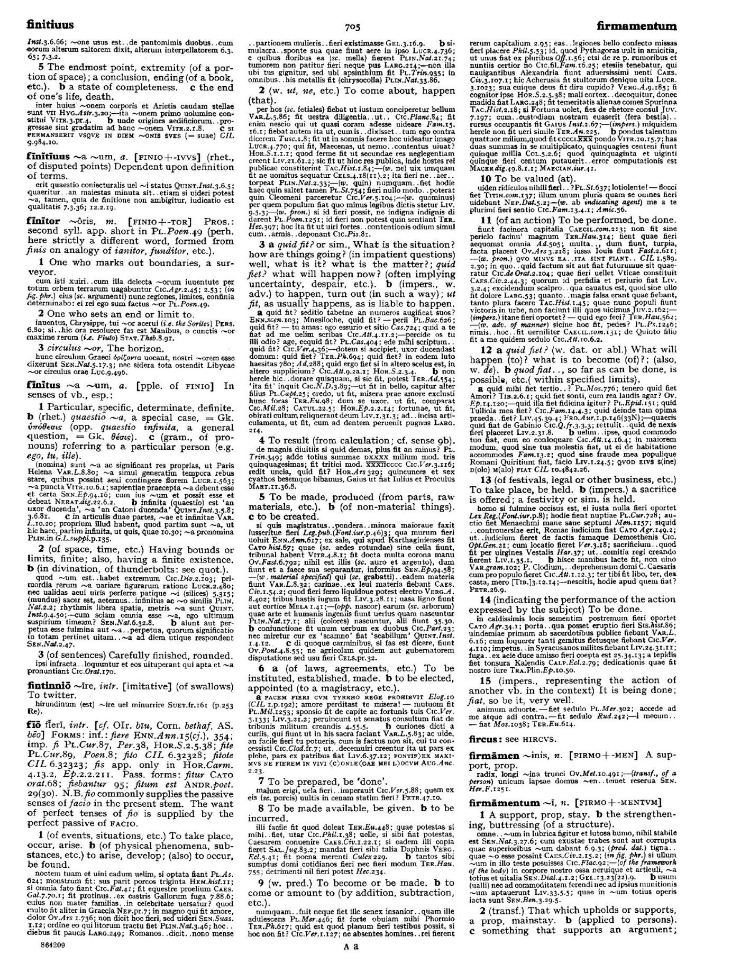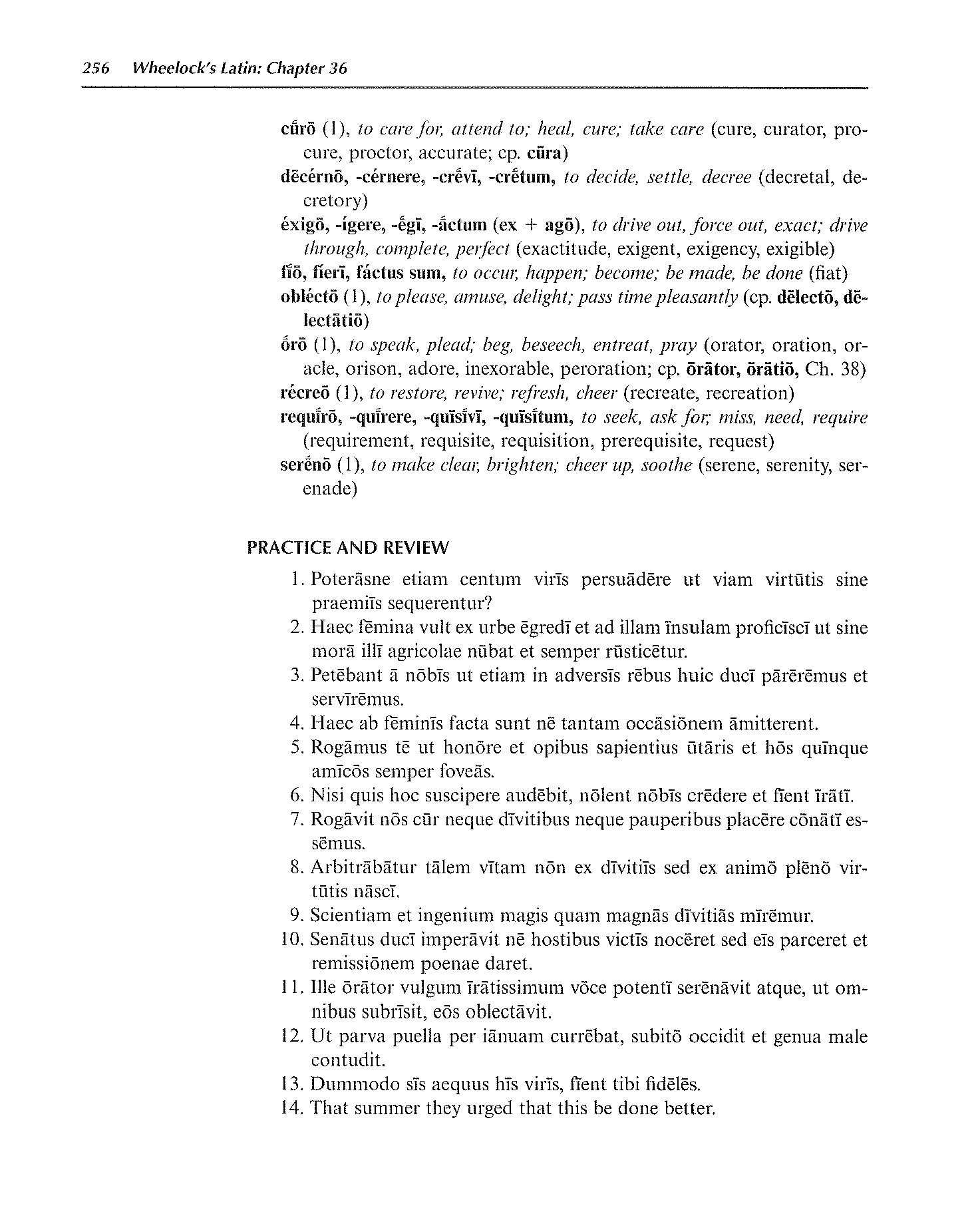
page_listing.tpl
page_subListingDetails.tpl
sub_listingDetails_style1.tpl
sub_listingDetails.title.tpl
fierī to occur
fierī is a Latin Verb that primarily means to occur.
Definitions for fierī
Wheelock's Latin
Verb
- 1
to occur, happen; become; be made, be done
English derivatives:
fiat
Oxford Latin Dictionary
Verb
- 1
(of events, situations, etc.) To take place, occur, arise. (b) (of physical phenomena, substances, etc.) to arise, develop; (also) to occur, be found.
- 2
(w. ut, ne, etc.) To come about, happen (that).
- 3
(a) quid fit? or sim., WHat is the situation? how are things going? (in impatient questions) well, what is it? what is the matter?; quid fiet? what will happen now? (often implying uncertainty, despair, etc.). (b) (impers., w. adv.) to happen, turn out (in such a way); ut fit, as usually happens, as is liable to happen.
- 4
To result (from calculation; cf. sense 9b).
- 5
To be made, produced (from parts, raw materials, etc.). (b) (of non-material things). (c) to be created.
Sentences with fierī
Latin to English
Caesar cūrāvit ut imperium suum maximum in cīvitāte fieret.Compare Caesar took care that his power be made greatest in the state.
Putō deus fīō. (Suetonius, Vespasian XXIII)Compare I think I'm becoming a god! (Spoken by the emperor Vespasian on his deathbed.)
Odi et amo. Quare id faciam, fortasse requiris. Nescio, sed fieri sentior et exrucior.Compare I hate and love. Why I do so, perhaps you ask. I know not, but I feel it, and I am in torment.
Iterum tribunus plebs fio volo.Compare He wished to be made tribune of the people a second time.
Quid aliud fieri potuit?Compare What else could have been done?
Inde plebs ab iuvenis Patres iniuria fio coepi.Compare Then injuries began to be inflicted on the people by the younger patricians.
Nolo ad vester lex atque institutum exigo is qui Lacedaemon fio.Compare Do not measure by your laws and institutions what is done at Lacedaemon.
Conjugation table for fierī
Cactus2000
| ACTIVE | |
| Indicative present | Indicative imperfect |
| fīō fīs fit fīmus fītis fīunt | fīēbam fīēbās fīēbat fīēbāmus fīēbātis fīēbant |
| Indicative perfect | Indicative pluperfect |
| factus sum factus es factus est factī sumus factī estis factī sunt | factus eram factus erās factus erat factī erāmus factī erātis factī erant |
| Indicative future | Indicative future perfect |
| fīam fīēs fīet fīēmus fīētis fīent | factus erō factus eris factus erit factī erimus factī eritis factī erunt |
| Subjunctive present | Subjunctive imperfect |
| fīam fīās fīat fīāmus fīātis fīant | fierem fierēs fieret fierēmus fierētis fierent |
| Subjunctive perfect | Subjunctive pluperfect |
| factus sim factus sīs factus sit factī sīmus factī sītis factī sint | factus essem factus essēs factus esset factī essēmus factī essētis factī essent |
Infinitive present fierī Infinitive perfect factum esse Infinitive future factūrum esse | Imperative present fī fīte Imperative future fītō fītō - fīuntō |
| PARTICIPLE | ||
| Participle present active | ||
| fiēns | fientēs | |
| fiēns | fientēs | |
| fiēns | fientēs | |
| fiēns | fientēs | |
| fiēns | fientēs | |
| Participle future active | ||
| factūrus | factūrī | |
| factūrus | factūrī | |
| factūrus | factūrī | |
| factūrus | factūrī | |
| factūrus | factūrī | |
| Participle perfect passive | ||
| factus | factī | |
| factus | factī | |
| factus | factī | |
| factus | factī | |
| factus | factī | |
| Gerundive | ||
| fiendus | fiendī | |
| fiendus | fiendī | |
| fiendus | fiendī | |
| fiendus | fiendī | |
| fiendus | fiendī | |
| Gerund | Supine | |
| fierī | factum | |
| fierī | factū | |
| fierī | ||
| fierī | ||
| fierī | ||
| PARTICIPLE | ||
| Participle present active | ||
| Nom. | fiēns | fientēs |
| Gen. | fientis | fientium |
| Dat. | fientī | fientibus |
| Acc. | fientem | fientēs |
| Abl. | fiente | fientibus |
| Participle future active | ||
| Nom. | factūrus | factūrī |
| Gen. | factūrī | factūrōrum |
| Dat. | factūrō | factūrīs |
| Acc. | factūrum | factūrōs |
| Abl. | factūrō | factūrīs |
| Participle perfect passive | ||
| Nom. | factus | factī |
| Gen. | factī | factōrum |
| Dat. | factō | factīs |
| Acc. | factum | factōs |
| Abl. | factō | factīs |
| Gerundive | ||
| Nom. | fiendus | fiendī |
| Gen. | fiendī | fiendōrum |
| Dat. | fiendō | fiendīs |
| Acc. | fiendum | fiendōs |
| Abl. | fiendō | fiendīs |
| Gerund | Supine | |
| Nom. | fierī | factum |
| Gen. | fiendī | factū |
| Dat. | fiendō | |
| Acc. | fiendum | |
| Abl. | fiendō | |
Data sources
Notes
- Definitions
- Frederick M. Wheelock, Wheelock's Latin, 6th ed., rev. Richard A. LaFleur (New York, NY: HarperCollins Publishers, 2005): 256.
- P. G. W. Glare, Oxford Latin Dictionary, Vols. 1-8 (Oxford: Clarendon Press, 1982): 705.
- Word frequencies
- Christopher Francese, "Latin Core Vocabulary," Dickinson College Commentaries, last modified 2014, http://dcc.dickinson.edu.
- Paul B. Diederich, The Frequency of Latin Words and Their Endings, PhD diss., (Columbia University, 1939).
- Louis Delatte, Suzanne Govaerts, Joseph Denooz, and Etienne Evrard, Dictionnaire fréquentiel et index inverse de la langue latine [Frequency Dictionary and Inverse Index of the Latin Language] (Liège, Belgium: Laboratoire d'analyse statistique des langues anciennes de l'Université de Liège [L.A.S.L.A.], 1981): 120.
Bibliography
Allen, Joseph H. Allen and Greenough's New Latin Grammar for Schools and Colleges: Founded on Comparative Grammar. Edited by James B. Greenough, George L. Kittredge, Albert A. Howard, and Benjamin L. D'Ooge. Boston, MA: Ginn & Company, 1903.
Crystal, David. A Dictionary of Linguistics and Phonetics. 6th ed. Oxford, UK: Blackwell Publishing, 2008.
Delatte, Louis, Suzanne Govaerts, Joseph Denooz, and Etienne Evrard. Dictionnaire fréquentiel et index inverse de la langue latine [Frequency Dictionary and Inverse Index of the Latin Language]. Liège, Belgium: Laboratoire d'analyse statistique des langues anciennes de l'Université de Liège (L.A.S.L.A.), 1981.
Diederich, Paul B. The Frequency of Latin Words and Their Endings. PhD diss., Columbia University, 1939.
Francese, Christopher. "Latin Core Vocabulary." Dickinson College Commentaries. Last modified 2014. http://dcc.dickinson.edu/latin-vocabulary-list.
Gildersleeve, Basil L., and Gonzales Lodge. Gildersleeve's Latin Grammar: Third Edition, Revised, and Enlarged. 3rd ed. London, England: Macmillan and Co., 1903.
Glare, Peter G.W. Oxford Latin Dictionary. Vols. 1-8. Oxford, England: Clarendon Press, 1982.
Krüger, Bernd. "Latin Conjugation Tables." Cactus2000. Accessed May 5, 2023. https://latin.cactus2000.de/index.en.php.
Pierson, Nick. "Sound of Text." Accessed October 26, 2019. https://soundoftext.com.
Wheelock, Frederick M. Wheelock's Latin. 6th ed. Revised by Richard A. LaFleur. New York, NY: HarperCollins Publishers, 2005.
Wiktionary Contributors. "Victionarium." Wikimedia Foundation, Inc. Updated March 18, 2019. https://la.wiktionary.org/wiki/Victionarium:Pagina_prima.
Citation
Chicago (17th ed.)
Allo Contributors. "fīō, fierī, factus sum (v.) - Latin Word Definition." Allo Latin Dictionary. Last modified . Accessed February 16, 2026. http://ancientlanguages.org/latin/dictionary/fio-fieri-factus-sum.
Entry created on . Last updated on .







